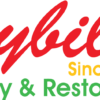Ethiopian Immigrants Motivated to Expand Home Healthcare Business
Date: September 14, 2018
Abe Dalu, who is from Oromia, Ethiopia, has a PhD in toxicology and experience in preclinical drug safety assessment. His wife, Aster, also from Oromia, Ethiopia, is a registered nurse. So when the pair decided to launch their own business—Dalu’s layoff during the Recession motivated them to seek firmer control over their future—a healthcare venture made sense.
The couple enrolled in a 10-week small-business course at the Neighborhood Development Center, then began pulling from their savings and retirement. To accept Medicare patients, they would have to provide services—nursing, physical and occupational therapy, and home healthcare—free of charge for a 10-month evaluation period. “It’s very challenging to get that certification,” says Dalu. “We got it on the first shot.”
Now, five years after that arduous trial, A&A Reliable Home Health Care—named for Abe and Aster—has close to 60 full-time employees in St. Paul and is on course to continue expansion. “I would say that I’m behind my expectation,” says Dalu. “But I’m happy where we are.”
For Dalu, reinvention is nothing new. Dalu is an Oromo, a member of the largest ethnic group in Ethiopia. He graduated from high school shortly after the Derg, a communist revolutionary force, assumed power and restricted travel to western nations. To receive a higher education, Dalu had to go to the former Soviet Union, where in 1984 he received a master’s degree in agronomy.
But he says returning home to “a Marxist-Leninist country” that jailed people for practicing their religion was not an option. As a boy, Dalu had attended a school run by American and European missionaries from the Seventh-day Adventist Church, and he remained a practicing Christian.
“So I decided to flee to West Berlin,” he says. He talked his way to a port of exit, where he bought a train ticket to West Berlin and applied for political asylum in West Germany. Nine months later, he was granted asylum to the United States and was resettled in Monroe, Louisiana.
Then came the next kink: Degrees from the Soviet Union were not well-received by U.S. employers. “I couldn’t find a job,” he says. So Dalu earned a master’s degree in biology and a PhD in toxicology from the University of Louisiana at Monroe, and, following post-doctoral research in Alabama, worked at an FDA lab in Arkansas and for Dow Corning in Michigan before moving to Minnesota in 2002 to take a job at 3M. He later commuted to Wisconsin to direct drug-safety research before settling full time in St. Paul to start a business.
We created jobs. This keeps me thrilled being able to do that, and being able to help seniors and disabled individuals.
Today, nearly two-thirds of A&A Reliable’s clients are U.S.-born patients, and half are senior citizens—a population increasingly eager to age at home. About 90 percent of company revenue has gone back into the company to hire and expand. “We created jobs,” Dalu says. “This keeps me thrilled being able to do that, and being able to help seniors and disabled individuals.”





